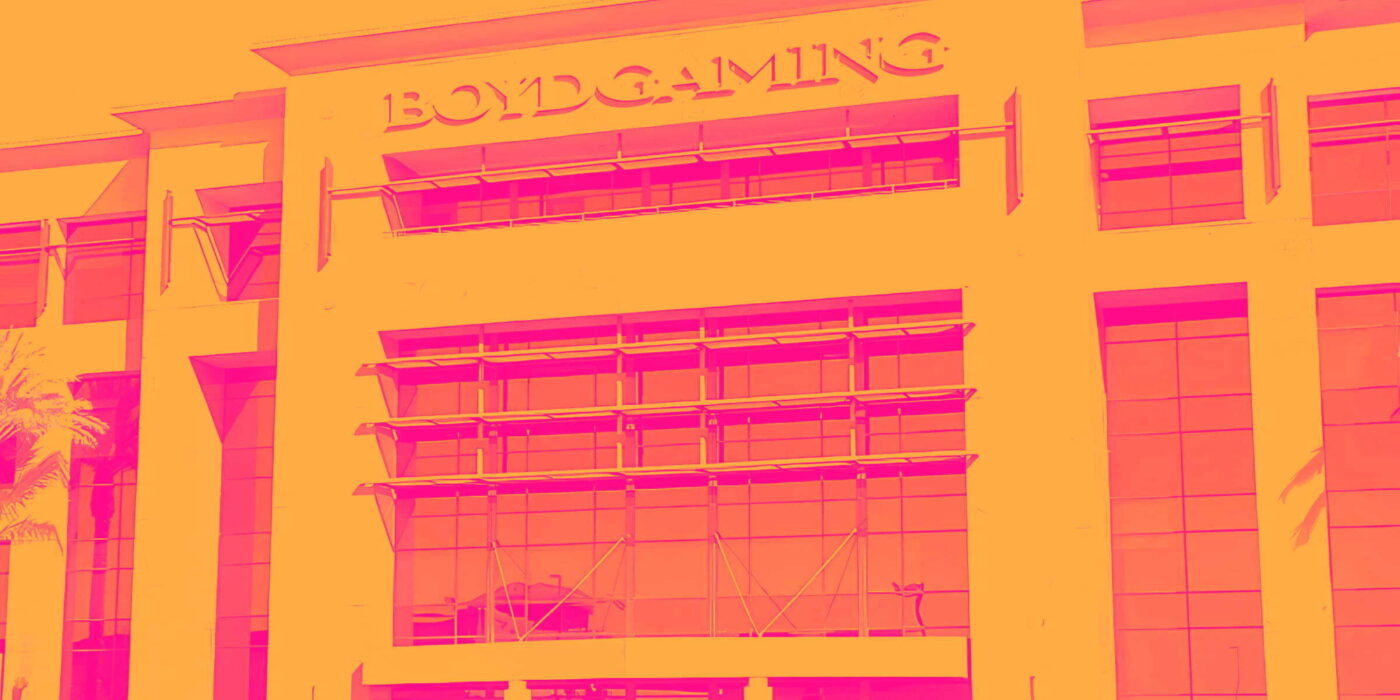Gaming and hospitality company Boyd Gaming (NYSE:BYD) reported results in line with analysts' expectations in Q1 CY2024, with revenue flat year on year at $960.5 million. It made a non-GAAP profit of $1.51 per share, down from its profit of $1.71 per share in the same quarter last year.
Boyd Gaming (BYD) Q1 CY2024 Highlights:
- Revenue: $960.5 million vs analyst estimates of $954.5 million (small beat)
- EPS (non-GAAP): $1.51 vs analyst expectations of $1.59 (4.9% miss)
- Gross Margin (GAAP): 51.6%, down from 64.2% in the same quarter last year
- Market Capitalization: $6.09 billion
Run by the Boyd family, Boyd Gaming (NYSE:BYD) is a diversified operator of gaming entertainment properties across the United States, offering casino games, hotel accommodations, and dining.
Boyd Gaming was established in 1975 by Sam Boyd, a former casino dealer with extensive experience in the gaming industry. Today, Boyd Gaming operates a diverse portfolio of properties across various states that allow its guests to gamble.
The company's offerings include not only casino games but also hotel accommodations, dining options, and recreational activities. This holistic approach caters to a broad audience, from gaming enthusiasts to families seeking a complete entertainment experience. Boyd Gaming's properties often feature amenities like pools, spas, shopping centers, and convention spaces.
The primary revenue streams for Boyd Gaming come from its casino operations, hotel services, food and beverage sales, and entertainment offerings. Despite being based in Paradise, Nevada, the company is geographically diversified, allowing it to appeal to both local customers and tourists.
Casino Operator
Casino operators enjoy limited competition because gambling is a highly regulated industry. These companies can also enjoy healthy margins and profits. Have you ever heard the phrase ‘the house always wins’? Regulation cuts both ways, however, and casinos may face stroke-of-the-pen risk that suddenly limits what they can or can't do and where they can do it. Furthermore, digitization is changing the game, pun intended. Whether it’s online poker or sports betting on your smartphone, innovation is forcing these players to adapt to changing consumer preferences, such as being able to wager anywhere on demand.
Competitors in the gaming sector include Caesars Entertainment (NASDAQ:CZR), MGM Resorts (NYSE:MGM), and PENN Entertainment (NASDAQ:PENN).Sales Growth
A company's long-term performance can indicate its business quality. Any business can enjoy short-lived success, but best-in-class ones sustain growth over many years. Boyd Gaming's annualized revenue growth rate of 5.6% over the last five years was weak for a consumer discretionary business. 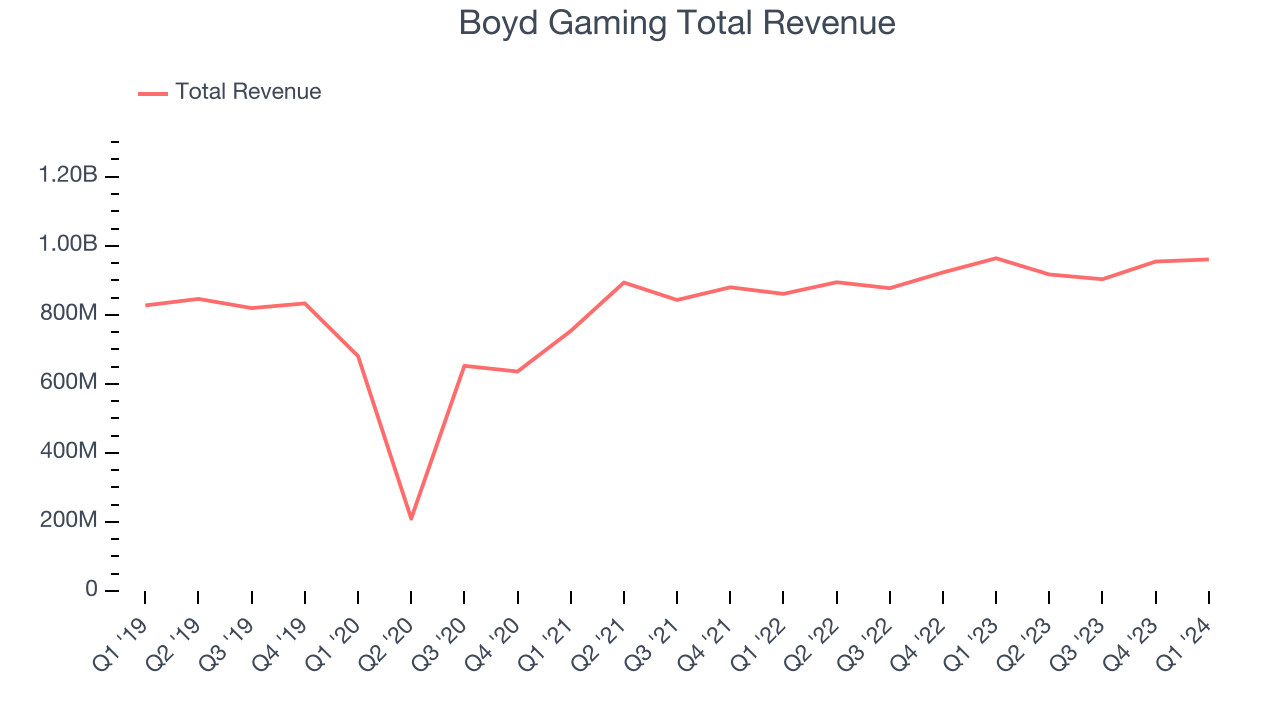 Within consumer discretionary, a long-term historical view may miss a company riding a successful new product or emerging trend. That's why we also follow short-term performance. Boyd Gaming's recent history shows the business has slowed as its annualized revenue growth of 3.6% over the last two years is below its five-year trend.
Within consumer discretionary, a long-term historical view may miss a company riding a successful new product or emerging trend. That's why we also follow short-term performance. Boyd Gaming's recent history shows the business has slowed as its annualized revenue growth of 3.6% over the last two years is below its five-year trend.
We can better understand the company's revenue dynamics by analyzing its most important segment, Gaming. Over the last two years, Boyd Gaming's Gaming revenue (casino games) averaged 3.1% year-on-year declines. This segment has lagged the company's overall sales.
This quarter, Boyd Gaming's $960.5 million of revenue was flat year on year and in line with Wall Street's estimates. Looking ahead, Wall Street expects revenue to remain flat over the next 12 months.
Operating Margin
Operating margin is a key measure of profitability. Think of it as net income–the bottom line–excluding the impact of taxes and interest on debt, which are less connected to business fundamentals.
Boyd Gaming has been a well-oiled machine over the last two years. It's demonstrated elite profitability for a consumer discretionary business, boasting an average operating margin of 25%.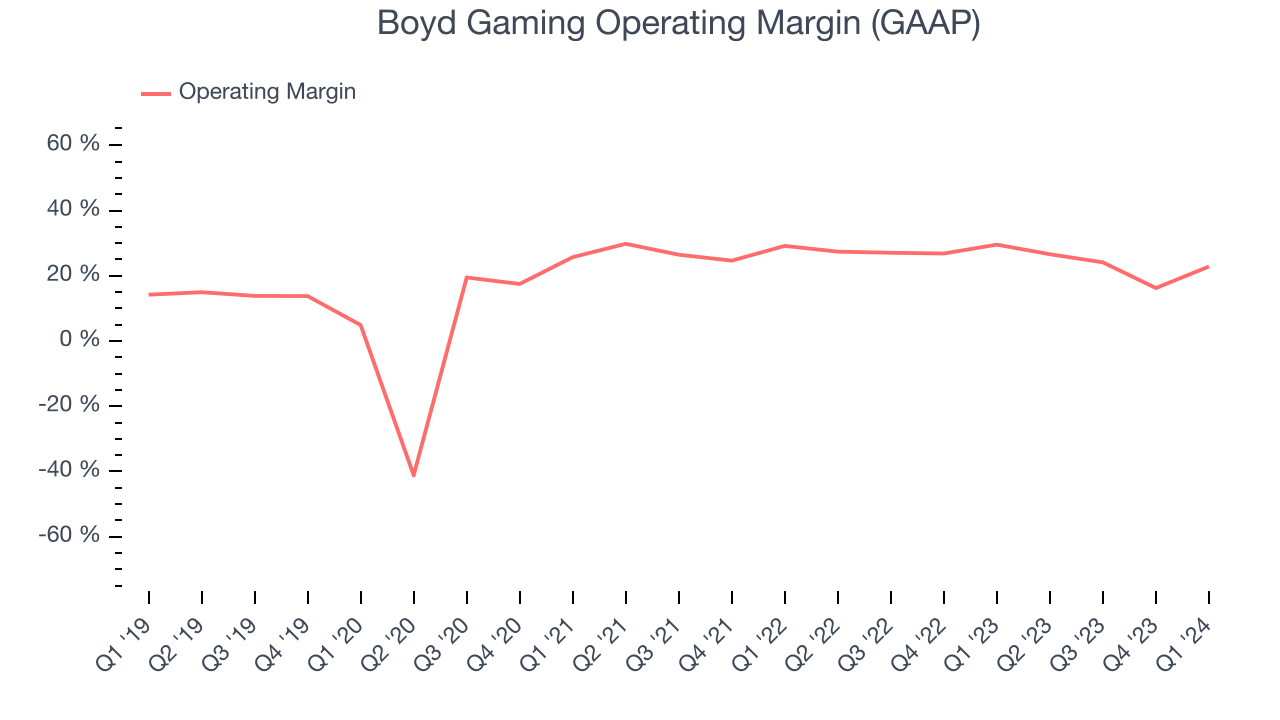
In Q1, Boyd Gaming generated an operating profit margin of 22.8%, down 6.7 percentage points year on year.
Over the next 12 months, Wall Street expects Boyd Gaming to become more profitable. Analysts are expecting the company’s LTM operating margin of 22.4% to rise to 24.9%.EPS
We track long-term historical earnings per share (EPS) growth for the same reason as long-term revenue growth. Compared to revenue, however, EPS highlights whether a company's growth was profitable. 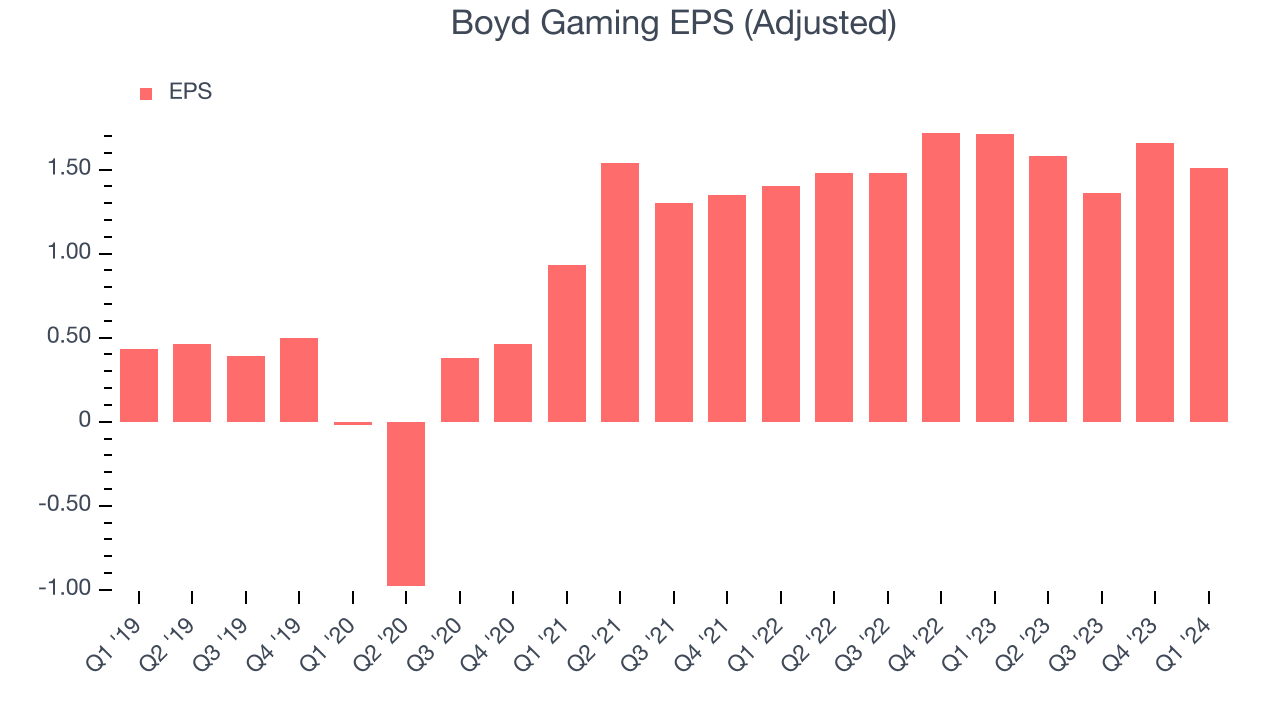
Over the last five years, Boyd Gaming's EPS grew 349%, translating into an astounding 35.1% compounded annual growth rate. This performance is materially higher than its 5.6% annualized revenue growth over the same period. There are a few reasons for this, and understanding why can shed light on its fundamentals.
While we mentioned earlier that Boyd Gaming's operating margin declined this quarter, a five-year view shows its margin has expanded 8.6 percentage points while its share count has shrunk 14.4%. Improving profitability and share buybacks are positive signs as they juice EPS growth relative to revenue growth.In Q1, Boyd Gaming reported EPS at $1.51, down from $1.71 in the same quarter last year. This print unfortunately missed analysts' estimates, but we care more about long-term EPS growth rather than short-term movements. Over the next 12 months, Wall Street expects Boyd Gaming to grow its earnings. Analysts are projecting its LTM EPS of $6.11 to climb by 2.9% to $6.29.
Return on Invested Capital (ROIC)
EPS and free cash flow tell us whether a company was profitable while growing revenue. But was it capital-efficient? A company’s ROIC explains this by showing how much operating profit a company makes compared to how much money the business raised (debt and equity).
Boyd Gaming's five-year average return on invested capital was 14.1%, somewhat low compared to the best consumer discretionary companies that pump out 25%+. Its returns suggest it historically did a subpar job investing in profitable business initiatives.
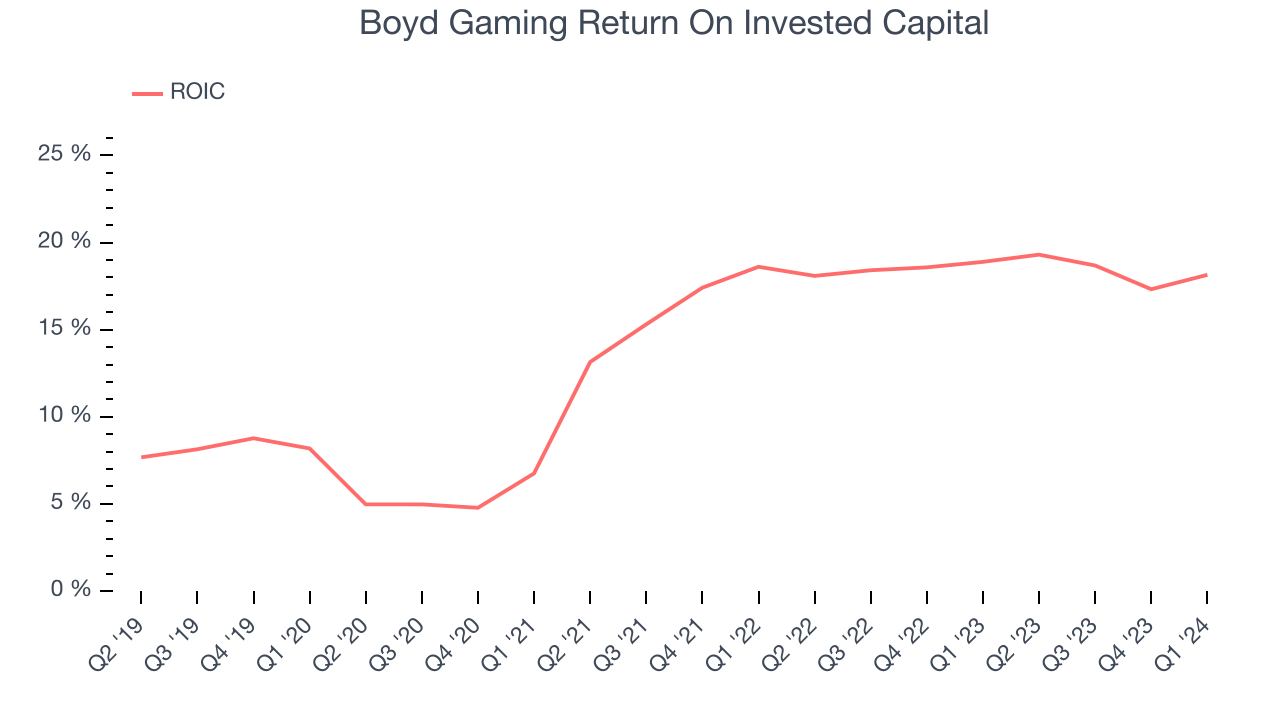
The trend in its ROIC, however, is often what surprises the market and drives the stock price. Over the last few years, Boyd Gaming's ROIC averaged 11.1 percentage point increases. This is a good sign, and if the company's returns keep rising, there's a chance it could evolve into an investable business.
Balance Sheet Risk
As long-term investors, the risk we care most about is the permanent loss of capital. This can happen when a company goes bankrupt or raises money from a disadvantaged position and is separate from short-term stock price volatility, which we are much less bothered by.
Boyd Gaming reported $283.5 million of cash and $2.9 billion of debt on its balance sheet in the most recent quarter. As investors in high-quality companies, we primarily focus on two things: 1) that a company's debt level isn't too high and 2) that its interest payments are not excessively burdening the business.
With $1.25 billion of EBITDA over the last 12 months, we view Boyd Gaming's 2.1x net-debt-to-EBITDA ratio as safe. We also see its $79.78 million of annual interest expenses as appropriate. The company's profits give it plenty of breathing room, allowing it to continue investing in new initiatives.
Key Takeaways from Boyd Gaming's Q1 Results
We struggled to find many strong positives in these results. Its Gaming revenue unfortunately missed and its EPS fell short of Wall Street's estimates. When explaining the results, management noted it experienced increased competitive pressures in its Las Vegas Locals market. Pedestrian traffic in downtown Las Vegas was also down.
A silver lining was that the company's new Sky River Casino, which opened 18 months ago in Northern California, is growing nicely. Overall, this was a mixed quarter for Boyd Gaming and the market is penalizing it for the shaky commentary. The company is down 7.7% on the results and currently trades at $58.01 per share.
Is Now The Time?
Boyd Gaming may have had a tough quarter, but investors should also consider its valuation and business qualities when assessing the investment opportunity.
We have other favorites, but we understand the arguments that Boyd Gaming isn't a bad business. Although its revenue growth has been uninspiring over the last five years with analysts expecting growth to slow from here, its impressive operating margins show it has a highly efficient business model. Investors should still be cautious, however, as its projected EPS for the next year is lacking.
Boyd Gaming's price-to-earnings ratio based on the next 12 months is 10.0x. In the end, beauty is in the eye of the beholder. While Boyd Gaming wouldn't be our first pick, if you like the business, the shares are trading at a pretty interesting price right now.
Wall Street analysts covering the company had a one-year price target of $76.51 per share right before these results (compared to the current share price of $58.01).
To get the best start with StockStory, check out our most recent stock picks, and then sign up for our earnings alerts by adding companies to your watchlist here. We typically have the quarterly earnings results analyzed within seconds of the data being released, and especially for companies reporting pre-market, this often gives investors the chance to react to the results before the market has fully absorbed the information.
